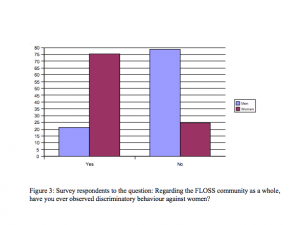I was on the radio program Think Out Loud here in Portland this morning. Before getting on the radio, I prepared a few things to say and wanted to share a longer form of what I was thinking.
I’ve been blogging more about women’s issues in relation to open source community and technology more generally. The experience is finally something that’s pretty fun — because there is finally research, success stories and a real sense of optimism among my friends and colleagues.
This is in no small part because of the wonderful experiences I’ve had working in open source and on PostgreSQL.
If you want to listen in, there’s a tiny link to download an mp3, or listen to the stream at the top of this page.
The index card I brought into the studio with me had the following on it:
- The first step – admit we’ve got a problem
- Open Source Bridge
- gender gap vs cut programs 4 mentors
- more brogrammers than women
- solutions: environment, community inviting, make friends, training/programming at Etsy/Python
- Ada Initiative
I was pretty happy to hit most of those points.
Here’s some writing I’ve done previously that’s directly relevant to the topic of the show:
- To sir with love, how to get more women involved in open source
- What I mean when I say I would like more women in the software industry
And for some rough background on the causes of the lack of women, I have an old blog post about a few of the reasons researchers point to.
Here are some of the thoughts I wrote down last night before going into the studio:
Resources
- Unlocking the clubhouse – Jane Margolis – which includes specific actions universities should take
- FLOSSPOLS study – which includes specific policy recommendations based on research
- Geek Feminism Wiki
- Ada Initiative
Difference in Perception
Brogrammer
It’s a funny term. Do I think people who fit that description exist? Sure they do. I’ve spent a lot of time in the open source community. And I’d even say that I’ve met more guys who fit some part of the stereotype than there are women. But that says more about how few women there are than anything else.
More about me
I’m an open source conference organizer and Postgres major contributor, and I’m an advisor to the Ada Initiative, supporting women in open source software.
I love open source community and spend most of my free time volunteering for Postgres. I start conferences like Open Source Bridge and Postgres Open because I want to see more people getting together and working on open source.
Three years ago I was writing blog posts about how many women I now see in the open source community – running events, writing code and just showing up. We have a long way to go to achieve gender balance, but it’s now common to see 15-20% women at local technical events. When I first started attending events in 1999, I was often the only woman.
The research
Only 2-10% of open source contributors are women and only 10% of business executives worldwide are women. The research out there says that while there’s some overt sexism, but another problem women face is a “death by a 1000 cuts” problem. Lots of small incidents that add up to most women feeling like they don’t belong in STEM careers – science technology engineering and math.
Unlocking the Clubhouse talks about this. There’s a feeling a woman gets when she walks into a clubhouse for men, that tells her she doesn’t belong. And this book addresses what we can do about it. The book offers suggestions for changing this environment at Universities based on research with women and ethnic minorities. Suggestions include encouraging women to join study groups, changing shared spaces to welcome women and carefully finding ways for women to maintain their own identity, rather than becoming “one of the guys”.
Code of conduct
One of the things that the Ada Initiative and Geek Feminism wiki have done is help people and organizations think through and document their playbook for incidents. We now have a template for a code of conduct, resources for learning more about feminism and detailed instructions for how to support women.
These are essentially playbooks for what women can expect from conference organizers if they experience a harassing or worse situation.
The truth is, many people do not know how to respond when they see harassment, or are themselves harassed. So giving people a guideline, talking it through and making it public helps set a tone that’s much better.
What can I do to help?
The “Resources for Allies” is a good start.
What resources are there for support of Women in Tech?
Check out Jessamyn’s list!

Great job today, Selena.
There was a caller who made me want to damage my radio, though (which is especially problematic given that my radio, down here in California, is a Macbook Pro). The guy advised that before we do anything, we should figure out what the optimal male/female ratio is.
seriously??!
If you’re drowning, do you take a break to precisely identify the optimal landing point before swimming toward shore? If you can’t feed your family, do you have to calculate the precise annual income that will achieve your lifetime goals before going out and applying for a job?
I guess all it does is underscore your point #1, above: the first thing that needs to happen is to admit we have a problem. I suppose I live in a bit of a bubble, because I thought it was freakin’ obvious. But with people calmly making points like that, and Dell trotting out unabashed misogynists at corporate events, I guess there really is a long way to go just on point #1.
Props to you for staying calm..not sure I could have.